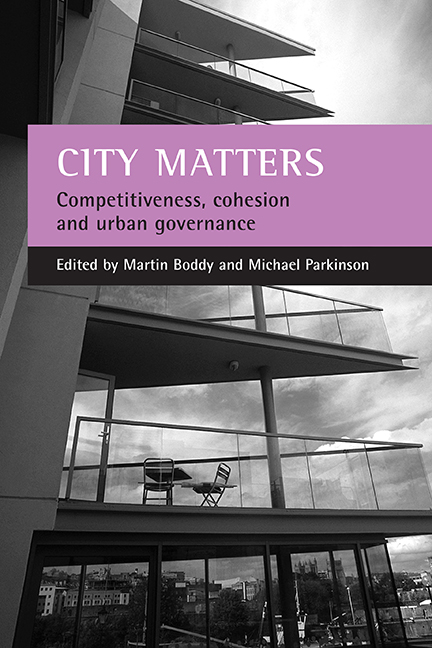Book contents
- Frontmatter
- Contents
- List of tables and figures
- Foreword
- Acknowledgements
- Notes on contributors
- one Introduction
- Part One Competitiveness, cohesion and urban governance
- Part Two Competitiveness and urban change
- Part Three Competitiveness, innovation and the knowledge economy
- Part Four Housing, property and economic performance
- Part Five Space, place and social cohesion
- Part Six Ethnicity, enterprise and social cohesion
- Part Seven Leadership, governance and social capital
- Conclusions
- Index
twelve - Economic structures, urban responses: framing and negotiating urban property development
Published online by Cambridge University Press: 20 January 2022
- Frontmatter
- Contents
- List of tables and figures
- Foreword
- Acknowledgements
- Notes on contributors
- one Introduction
- Part One Competitiveness, cohesion and urban governance
- Part Two Competitiveness and urban change
- Part Three Competitiveness, innovation and the knowledge economy
- Part Four Housing, property and economic performance
- Part Five Space, place and social cohesion
- Part Six Ethnicity, enterprise and social cohesion
- Part Seven Leadership, governance and social capital
- Conclusions
- Index
Summary
Property and urban development
… private property development is driven more by investment demand and suppliers’ decisions than by final user demand – even less by any sort of final user needs. (Edwards, 1990, p 175)
Property development makes many contributions to urban economies (Turok, 1992; Gibb et al, 2002). There is the direct impact of construction activity as a major sector of the economy. Beyond this, however, it can have a range of effects that can be critical to the competitive success or otherwise of particular urban areas. The quality and operating costs of the local building stock affect directly occupiers’ productivity and ability to expand. The availability of good accommodation may help to attract inward investment. In addition, property can support neighbourhood revitalisation via investment that upgrades the physical environment. Finally, large-scale redevelopment may be necessary to accommodate major changes in city functions in the face of economic restructuring.
In order to gain these benefits, however, cities need continuously to reproduce a stock of property that meets the requirements of local industry and the wider community. Significantly, however, a series of structural changes in the property sector and the wider economy has affected the capacity of particular urban areas to do this. Over the last 20 years, the private sector has increasingly assumed the role of the dominant supplier of buildings in Britain. It now accounts for more than three quarters of all new construction orders (Henneberry and Rowley, 2000). Construction projects have become larger and construction periods have become significantly shorter, increasing the elasticity of supply of new buildings (Ellison, 1998). The reduction in the public sector’s relative and absolute contribution to building production has also diminished its stabilising effect on development. The property market, therefore, has become more volatile and less tractable to policy.
In parallel with these trends, renting of commercial and industrial property has grown at the expense of owner-occupation. By 1995, around 45% by value of the UK commercial and industrial property stock was held by investors of which about half (24% of the stock) was held by UK institutions (Callendar and Key, 1996).
- Type
- Chapter
- Information
- City MattersCompetitiveness, Cohesion and Urban Governance, pp. 217 - 234Publisher: Bristol University PressPrint publication year: 2004
- 1
- Cited by



